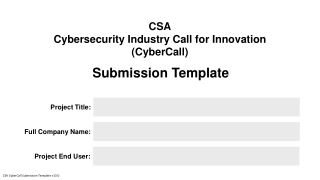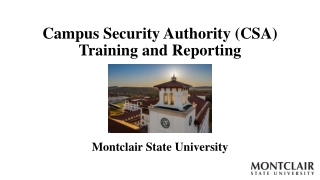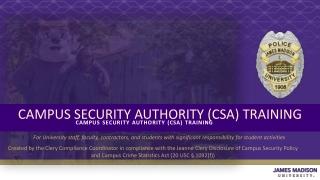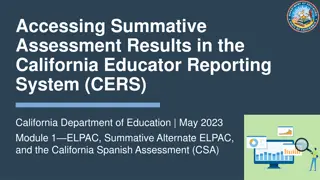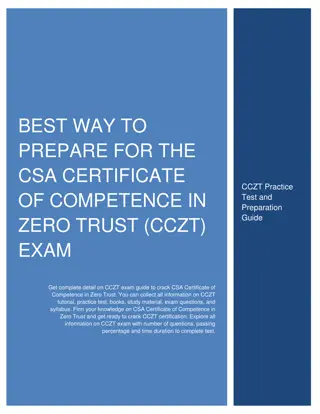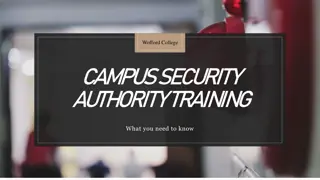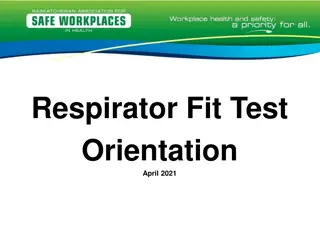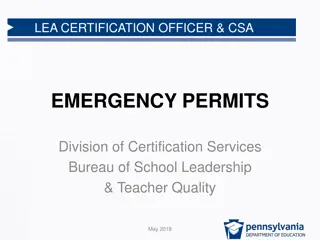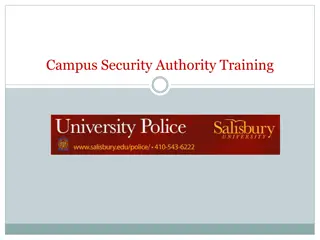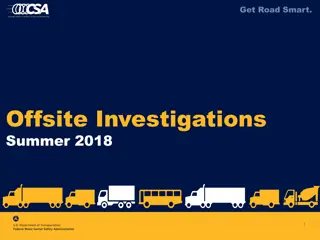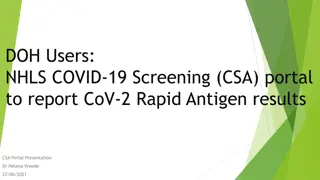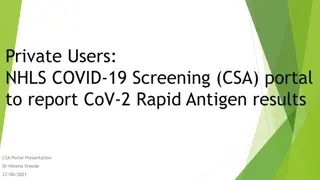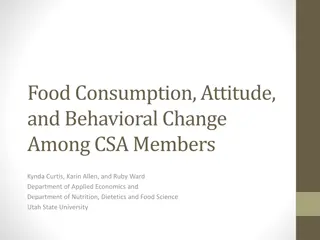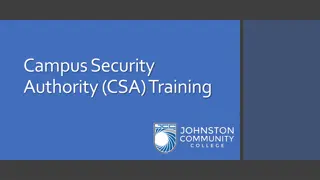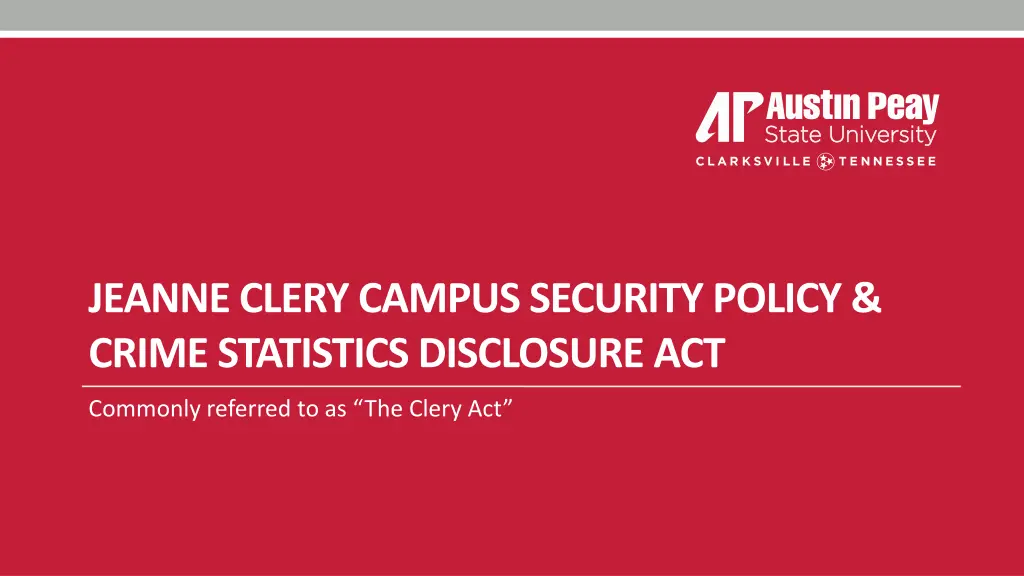
Understanding the Clery Act and Campus Security Policies
Discover the significance of the Clery Act, a law enacted to ensure campus safety by requiring universities to disclose crime statistics, report crimes and emergencies, maintain a crime log, and more. Learn about its impact and the crucial details included in the reports provided to students and staff.
Download Presentation

Please find below an Image/Link to download the presentation.
The content on the website is provided AS IS for your information and personal use only. It may not be sold, licensed, or shared on other websites without obtaining consent from the author. If you encounter any issues during the download, it is possible that the publisher has removed the file from their server.
You are allowed to download the files provided on this website for personal or commercial use, subject to the condition that they are used lawfully. All files are the property of their respective owners.
The content on the website is provided AS IS for your information and personal use only. It may not be sold, licensed, or shared on other websites without obtaining consent from the author.
E N D
Presentation Transcript
JEANNE CLERY CAMPUS SECURITY POLICY & CRIME STATISTICS DISCLOSURE ACT Commonly referred to as The Clery Act
What is the Clery Act? Jeanne Clery was raped and murdered in her dorm room at Lehigh University in 1986 by another student. Her school had not informed students about 38 violent crimes that occurred on campus in the three years prior to her murder. It is the belief of her parents that Jeanne would have been more cautious or made a different school choice if she had known about other violent crimes at Lehigh. The law enacted in her memory aims to ensure that students and other members of the campus community are informed about campus crime, enabling them to make informed decisions.
What is the Clery Act? The Clery Act requires that universities distribute crime statistics to current students and all campus employees by October 1 each year. Crime statistics must be made available to all perspective students, faculty and staff upon request.
What is included in the report Policies for reporting crimes and emergencies Crime reporting policy, procedure, and responses Campus Security Authorities and Resources Encouragement of prompt reporting of crimes Campus Sexual Assault Programs Enforcement and arrest authority of campus police Registered Sex Offender Information Working relationship with state and local police Emergency Notification and Timely Warning Policy Access to campus facilities and residence halls Missing Student Notification Policy Drug and alcohol abuse prevention information Annual Fire Safety Report Security considerations used in maintenance Campus and community crime statistics
Crime Log Information Campuses that maintain a police department are required to maintain a daily crime log that contains specified information about all crimes that occur within the patrol jurisdiction of the campus police and that are reported to the campus police department. The campus must make the crime log for the most recent 60-day period open to public inspection during normal business hours, while crime logs containing material more than 60-days old must be retained for seven years for public inspection upon two day s notice.
What does this mean to you? Many crimes (especially sexual assaults) go unreported to police but may be reported to others. Data is collected from Campus Security Authorities to get the most accurate crime statistics possible which is where you come in.
Timely Warnings Information provided by Campus Security Authority personnel will assist Public Safety in issuing Timely Warnings to alert the campus to crimes that pose a serious or continuing threat.
Campus Security Authority (CSA) Training Video Clery and CSA Training 2025-2026
Four Categories of Campus Security Authority University Police 1. Non-police security staff responsible for monitoring university property 2. People or offices designated by our policies as those to whom crimes should be reported 3. Officials with significant responsibility for students and campus activities which is YOU! 4.
Campus Security Authorities: Defined by function, not title. CSAs have: Significant responsibility for student and campus activities; Regular contact with students The category of Campus Security Authority is defined broadly to ensure complete coverage and thorough reporting of crimes.
CSA Functional Areas University President Athletics Director, Associate Directors, Assistant Directors, Coaching Staff, and Provost and Assistant Provost Trainers Vice Presidents and Associate Vice Presidents Registered Student Organization (RSO) Administrator of Students Faculty and Staff Advisors Division of Public Safety employees Academic Advisors University Housing Director, Associate Coordinator of Greek affairs Director, Area Coordinators, Residence Hall Title IX Coordinator Directors, Resident Assistants
Personnel not considered as Campus Security Authority Faculty without responsibility for students or campus activities outside the classroom. Administrative staff not responsible for students (e.g., payroll, facilities) Clerical Staff, maintenance, and food service workers Medical doctors, nurses and counselors responsible for student care.
Who is EXEMPT from reporting requirements? Pastoral Counselors (employed by a religious organization to provide confidential counseling) who are working within the scope of their license or religious assignment at the time they receive the crime report Professional Counselors Applies to mental health counselors employed or under contract by the University Person uncertified but acting under the supervision of an exempt counselor
Campus Security Authoritys Primary responsibility: to report allegations made in good faith to the reporting structure established by the Institution
As A Campus Security Authority If someone tells you about a crime or an incident that may be a crime, you must record the information and submit a report to APSU Public Safety. Just get the facts, experts will determine the crime Tell the victim about options to report and how to do so Offer help by connecting to campus programs that assist victims of sexual assault, dating violence, domestic violence and stalking
What must be reported Criminal Homicide Sex Offences Murder Rape Manslaughter Fondling Incest Other Offences Statutory Rape Burglary Aggravated Assault Motor Vehicle Theft Domestic Violence Arson Dating Violence Hate Crimes
As A Campus Security Authority You must also report Hate crimes Larceny-Theft Simple Assault Intimidation Liquor, Drug, and/or Illegal Weapons Possession Destruction/Damage/Vandalism of Property If motivated by bias (race, gender, gender identify, religion, sexual orientation, ethnicity/national origin disability) Report BOTH arrests and disciplinary referrals
Timing is Critical Be sure to document when the crime or incident occurred and when it was reported to you, the Campus Security Authority. The law requires that the crime be reported for the calendar year in which it was first reported to a Campus Security Authority, not when it was reported to police by the CSA.
Unfounded Crimes Sworn or commissioned law enforcement personnel who have fully investigated the reported crime and based on the result of this full investigation and evidence, law enforcement has made a formal determination the crime reported is false or baseless and therefore unfounded . Only sworn or commissioned law enforcement personnel may unfound a crime report.
Location A crime must be reported if it occurred on one of the following locations: Campus Campus Residence Facilities Non-campus Public Property adjacent to campus Roads, sidewalks, etc. Some non-campus locations Student organization owned/controlled property University owned/controlled property Frequently used by students property
How to report crime statistics to be considered Clery Report: For emergencies and crimes in progress APSU Public Safety (931) 221-7786 Fill out Campus Security Authority Crime & Incident Report Form found on the APSU Website, under CSA Worksheet https://www.apsu.edu/police/clery-act.php
Report the Facts Police will categorize the reported incidents Your job is to get the information. Remember: You are not a police officer or detective You do not have to prove what happened, determine who is at fault, or classify the crime You are not to find the perpetrator Use the CSA report form, but DO NOT identify the victim
Describe Options Let the person know the option to report crimes to the police A person who talks to you may not want to talk to the police, and they do not have to Exception: when the victim reports a crime to a professional who is mandated by law to report a crime; i.e., child abuse
Offer referrals to campus resources including: APSU Student Affairs, MUC 206 (931) 221-7341 APSU Student Health Services, ARD Building (931) 221-7107 APSU Counseling Services, ARD Building (931) 221-6162
Filling out the Report Form Is a violent crime in progress? If so, call police immediately! Describe the incident/crime What happened? How, when, where did it occur? Answering the questions on the form will help police determine the correct category Write a description of the incident/crime Incomplete information can be helpful
Filling out the Report Form You are not the expert, and you do not have to be You do not have to know the crime classification Indicate the crime that seems most likely Provide as much detail as possible, this helps prevent double reporting of the incident/crime Public Safety will make the final determination and classify the incident/crime
Annual Clery Report To get more information on campus safety and to read the Clery Report: https://www.apsu.edu/police/crime
Questions? Contact Chief Kristie Winters, Chief of Police wintersk@apsu.edu (931) 221-7794

